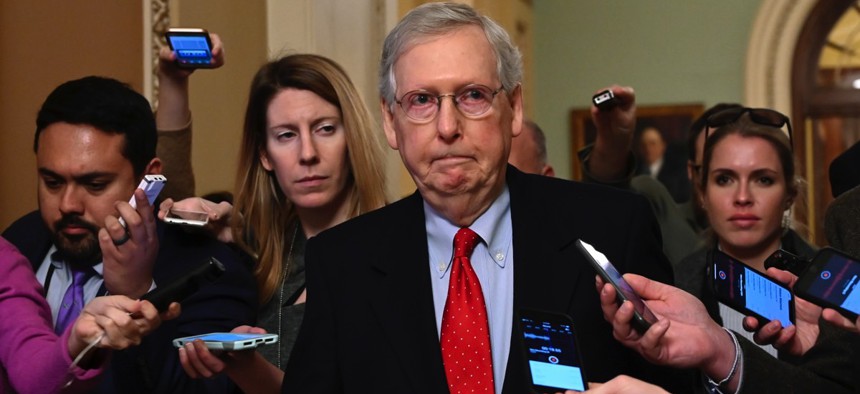Shutdown Struggles Loom for Localities in Need of Infrastructure, Affordable Housing Funding

Senate Majority Leader Mitch McConnell of Kentucky on Capitol Hill in Washington, D.C. on Jan. 2, after returning from a meeting with President Trump at the White House. Susan Walsh / AP Photo
What’s currently a distraction for governments could soon turn into a more serious situation.
Local officials are starting to sweat over just how long the federal government shutdown may last, especially if it limits the funding their jurisdictions receive for infrastructure and affordable housing projects.
“There's a sense growing that this is unlike previous shutdowns because there's no clear path forward,” Mike Wallace, community and economic development program director for the National League of Cities, told Route Fifty. “We keep hearing from Washington this could last a long time.”
While the partial shutdown remains a distraction at present, cities will soon need to have contingency plans in place should it run a month or longer, Wallace added.
During a prolonged shutdown, local governments must move money around to supplement federal funds.
“Each day of a federal shutdown increases the pain felt in cities, as funding dries up for programs that help develop local economies and support our nation’s most vulnerable residents,” said Gary, Indiana Mayor Karen Freeman-Wilson, NLC president, in a statement. “Cities don’t have the luxury of waiting—we urge the federal government to act now and honor its responsibility to serve the American people.”
House Democrats were moving forward with their plan to reopen the government on Thursday, as they retook the majority in that chamber. But that won’t end the shutdown. President Trump has said he won’t accept that proposal because it doesn’t include wall funding, which means it is not expected to get a vote in the Republican-controlled Senate.
Since the shutdown began almost two weeks ago, a few states have picked up the bills to keep services going in national parks. The local government in Washington, D.C., has also been deploying crews to pick up trash on federal property.
The Department of Housing and Urban Development and the Department of Agriculture are among the 10 federal agencies shutting down to various degrees, which could affect the affordable housing grants local governments are expecting, as well as rental assistance and voucher programs.
USDA Rural Development will not issue new housing loans during the shutdown, which help first-time homebuyers afford mortgages, low-income homeowners afford repairs and low-income renters afford rentals. Homebuyers in need of direct loans won’t be able to close on their homes as a result and may lose them, while those receiving guaranteed loans from a national bank could close—but without federal backup.
While the disbursement of previously obligated rental assistance funds will continue, Section 542 vouchers—which protect multi-family housing tenants in rural rental housing from undue economic hardship—are up in the air.
“What’s happening to those tenants?” asked Leslie Strauss, senior policy analyst with the Housing Assistance Council. “We have no idea whether they’re still getting their assistance.”
The average income of such tenants is under $13,000 a year, and almost two-thirds are elderly or disabled without much in the way of savings, Strauss added.
Should the shutdown stretch into February, the questions about whether localities will be able to access HUD grants or other agency funding will increase, Wallace said, and department determinations between now and then will matter. Jurisdictions won’t have a say in which grants they can draw down, and the people they typically call to ask about such information will have been furloughed.
“You’re trying to lay these plans down, but you have a big knowledge gap,” Wallace said. “Cities shouldn’t have to worry about a shutdown being part of the budget debate.”
NLC hopes to be part of the effort to pass a bill creating a bipartisan affordable housing task force this legislative session, Wallace added, but the shutdown could undermine the consensus building needed to accomplish both that and approval of an infrastructure package President Trump promised on the campaign trail.
States and cities also had a limited amount of time to put thousands of opportunity zones into place, and the shutdown is distracting officials from the second phase of developing partnerships to attract investment in those areas, Wallace said.
While the federal food stamp program will continue to allocate resources, some federal workers who are part of the distribution chain may wind up being furloughed over time. As a result, local governments would have to fill temporary personnel gaps, Wallace said.
NLC has asked city leaders to share shutdown struggles with the league, so it can spread the word quickly.
“For cities, any government shutdown just makes anything more expensive,” Wallace said.
Dave Nyczepir is a News Editor at Government Executive’s Route Fifty and is based in Washington, D.C.
NEXT STORY: Tax Cuts, Whale Funding and Pay Bonuses Among the Priorities in Governors' Proposed Budgets






